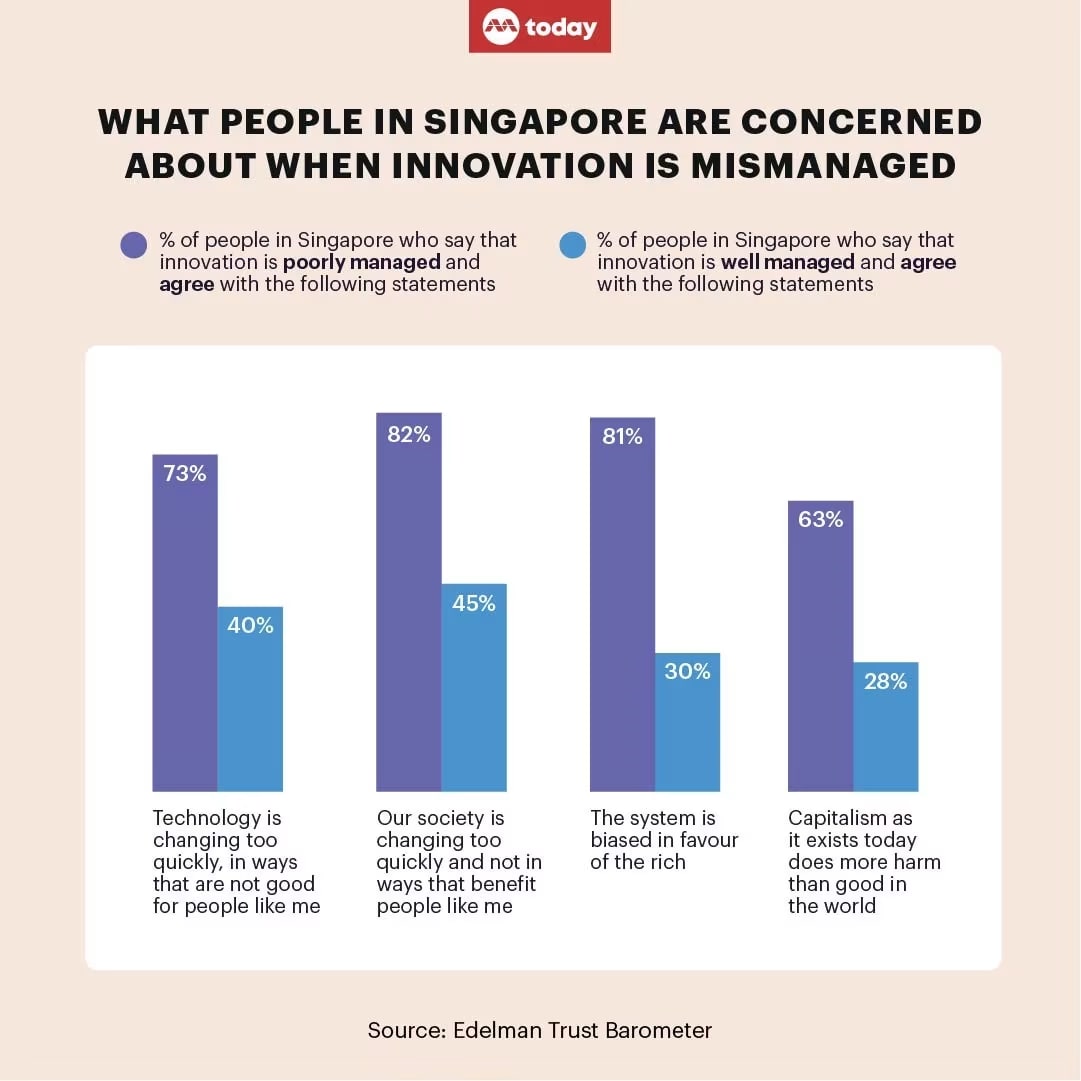Over half in Singapore say society, technology changing too fast, and in ways that don't benefit them: Survey
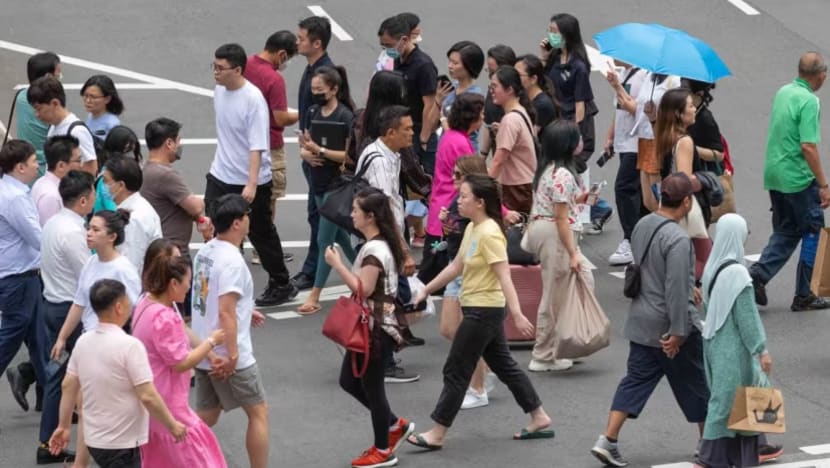
File photo of people in Singapore crossing a street. (Photo: TODAY)

This audio is generated by an AI tool.
- More than half of people here believe society and technology are changing too quickly and in ways that do not benefit them, a survey by global public relations firm Edelman has found
- When people feel innovation is mismanaged, they are significantly more likely to believe that both technology and society are leaving them behind, said the 2024 Edelman Trust Barometer report, released on Tuesday (Mar 12)
- About half here also worry that government leaders, business leaders, and journalists are intentionally trying to mislead them by saying things they knew were false or gross exaggerations
- Experts say the findings reflect a more diverse and critical citizenry in today’s post-truth era, which may tend to be more sceptical - and even cynical - of those in power
- To overcome this distrust, leaders would do well to communicate transparently, ensure their actions align with their words, and take accountability in the event of any wrongdoings, experts added
SINGAPORE: More than half of people here believe that society and technology are changing too quickly and in ways that do not benefit them, a survey has found.
More than one in four (28 per cent) of Singapore respondents also believe innovation is poorly managed, while 24 per cent say it is well managed, the survey by global public relations firm Edelman said.
When people feel innovation is mismanaged, they are significantly more likely to believe that both technology and society are leaving them behind, said the 2024 Edelman Trust Barometer report, released on Tuesday (Mar 12).
The firm surveyed more than 32,000 respondents in 28 countries - or about 1,150 respondents per country, including in Singapore - in November last year for the 24th edition of its annual global survey on trust and credibility.
The survey also found that amid growing fears about risks such as hackers and climate change, about half in Singapore worry that government leaders, business leaders, and journalists are intentionally trying to mislead them by saying things they knew were false or gross exaggerations.
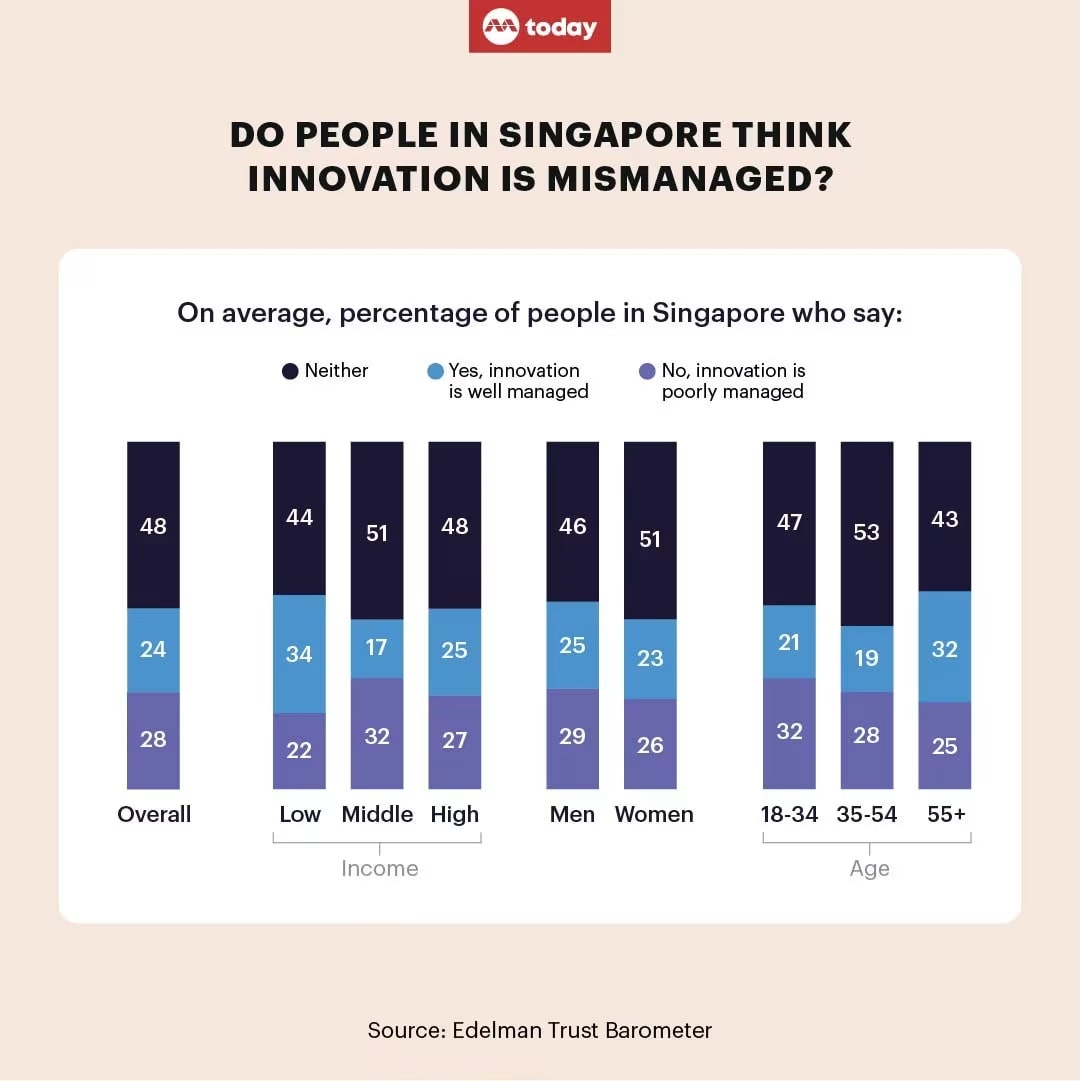
WHY IT MATTERS
Overall, Singapore respondents recorded a slightly higher level of trust in institutions to "do what is right", compared to the year before.
The 2024 trust index for Singapore - which measures the average trust in non-governmental organisations (NGOs), businesses, government, and media - rose to 67 per cent, from the 66 per cent recorded in both 2023 and 2022.
Yet, despite the increased trust in these institutions, more worry that they are being purposely misled by its people and leaders.
- More than half (55 per cent) in Singapore think journalists intentionally tried to mislead them, up from the 48 per cent who thought so the year before
- More than half (55 per cent) think business leaders intentionally tried to mislead them, compared to 50 per cent the year before
- Almost half (46 per cent) think government leaders intentionally tried to mislead them, compared to 42 per cent the year before
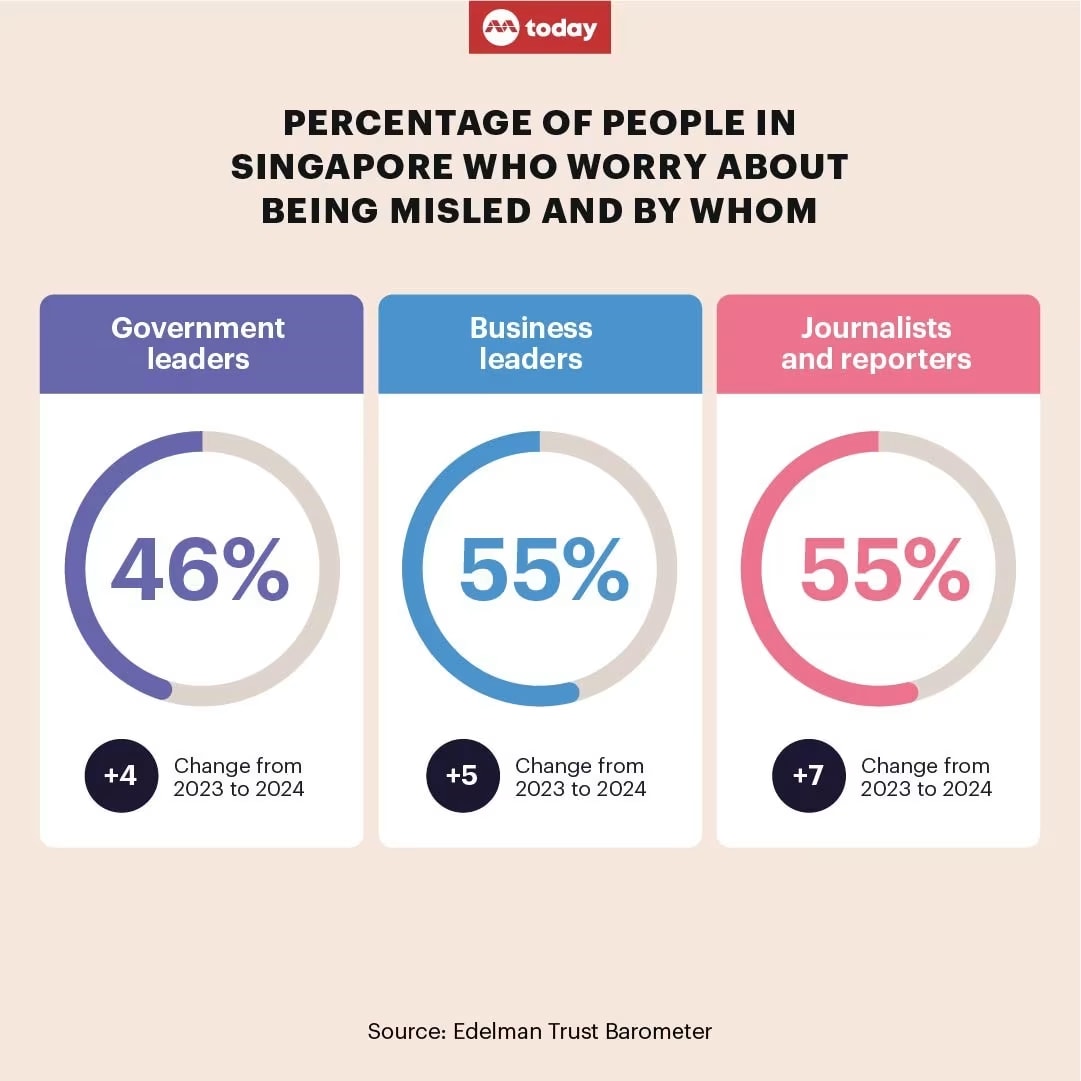
Responding to TODAY’s queries, Ms Julia Wei, chief executive officer of Edelman Singapore notes that an "enduring and stable ecosystem of trust" had developed in the country after the COVID-19 pandemic.
"Despite this ecosystem of trust, people in Singapore ... are wary of what they read and hear," she said.
"This scepticism could be a negative outcome of an increasingly polarised world, where traditionally trusted spokespersons and sources of information are viewed as partisan and biased," Ms Wei added.
Agreeing, Associate Professor Tan Ern Ser, a sociologist from the National University of Singapore (NUS), said the findings reflect a more diverse and critical citizenry, which may tend to be more sceptical - and even cynical - of those in power.
"In our post-truth era, there would also be misinformation and disinformation galore that could mislead people into distrusting otherwise sincere and truthful leaders," he added.
Dr Vincent Oh, a psychology lecturer at the Singapore University of Social Sciences (SUSS), said the proliferation of alternative viewpoints via social media platforms may have also contributed to growing distrust towards leaders.
While not inherently a bad thing as freedom of opinion and expression is "fundamental to any democracy", Dr Oh said that it also means contrarian views - or even conspiracy theories in more extreme cases - get more air-time, and people are more easily and widely exposed to these viewpoints.
These could thus lead to some overall shifts in attitudes towards mainstream media and narratives, he added.
Dr Shannon Ang, a sociologist at the Nanyang Technological University (NTU), also highlighted that trust in specific people and trust in institutions are "conceptually distinct".
"What the results may suggest is simply that while people’s trust in leaders may falter, they seem to continue to believe in the structures and processes that have been put in place," said Dr Ang.
In some cases, high trust in institutions may even moderate the effects of low interpersonal trust, he added.
Nevertheless, Dr Ang cautioned that this trust should not be taken for granted, and that untrustworthy leaders can ultimately still erode trust in institutions over time.
"It seems we are not seeing those effects yet, but that doesn’t mean it won’t happen."
REBUILDING TRUST
On the one hand, experts say a growing distrust in leaders could lead people to be more critical of what they are told, to check and assess information for themselves, and to demand greater transparency and accountability.
On the other hand, a breakdown of trust between leaders and society could erode institutional trust over time, resulting in more potential for conflict, less willingness to pay taxes, and so on, said Dr Ang from NTU.
If distrust is left uncorrected and people continue to believe that leaders are purposely trying to mislead them, Assoc Prof Tan from NUS said they may eventually vote to replace these leaders, or even the institution.
To overcome this distrust, leaders would do well to show willingness to gather feedback - including ones that are negative to them - and act on these, communicate transparently, ensure their actions align with their words, and take accountability in the event of any wrongdoings, said experts.
For those feeling left behind as technology and society change, Dr Gillian Koh, senior research fellow at the Institute of Policy Studies (IPS), said: "In Singapore, the narrative is often that business disruption due to technological change and even improvements will mean that workers will lose their jobs if they do not retrain.
"There is much less of a narrative of how technology is likely to create new jobs, add value to old jobs, or help existing workers with their current work. So most stories are skewed towards the 'change or die' angles.
"Unless you are younger, more tech-savvy, interested in innovation and have a positive outlook on science and technology, the mass base of people feel threatened by that sort of change."
Dr Oh from SUSS said that a perceived lack of choice likely also plays a major role in why some respondents might feel left behind by society and technology changes.
"As one example, when the shift to SimplyGo was initially announced, there was no 'opt-out' option and it was mandated. People may perceive that many societal and technological changes are unilaterally forced upon them," said Dr Oh.
As such, empowering individuals to have greater autonomy, and providing alternatives wherever possible, would likely smoothen the rollout of any such changes for many individuals.
Ultimately, people and leaders responsible for making those changes should also be mindful that there would be people who have difficulties catching up, said Assoc Prof Tan from SUSS.
Leaders must therefore communicate understanding and assurance, and provide the necessary assistance to help these individuals level up, he added.
OTHER KEY FINDINGS
The Edelman study found that more Singapore respondents worry about the following compared to the year before:
- Job loss (93 per cent), up from 90 per cent
- Hackers (80 per cent), up from 73 per cent
- Climate change (75 per cent), up from 70 per cent
- Nuclear war (72 per cent), up from 68 per cent
- Inflation (72 per cent), up from 71 per cent
- Information war (55 per cent), up from 50 per cent
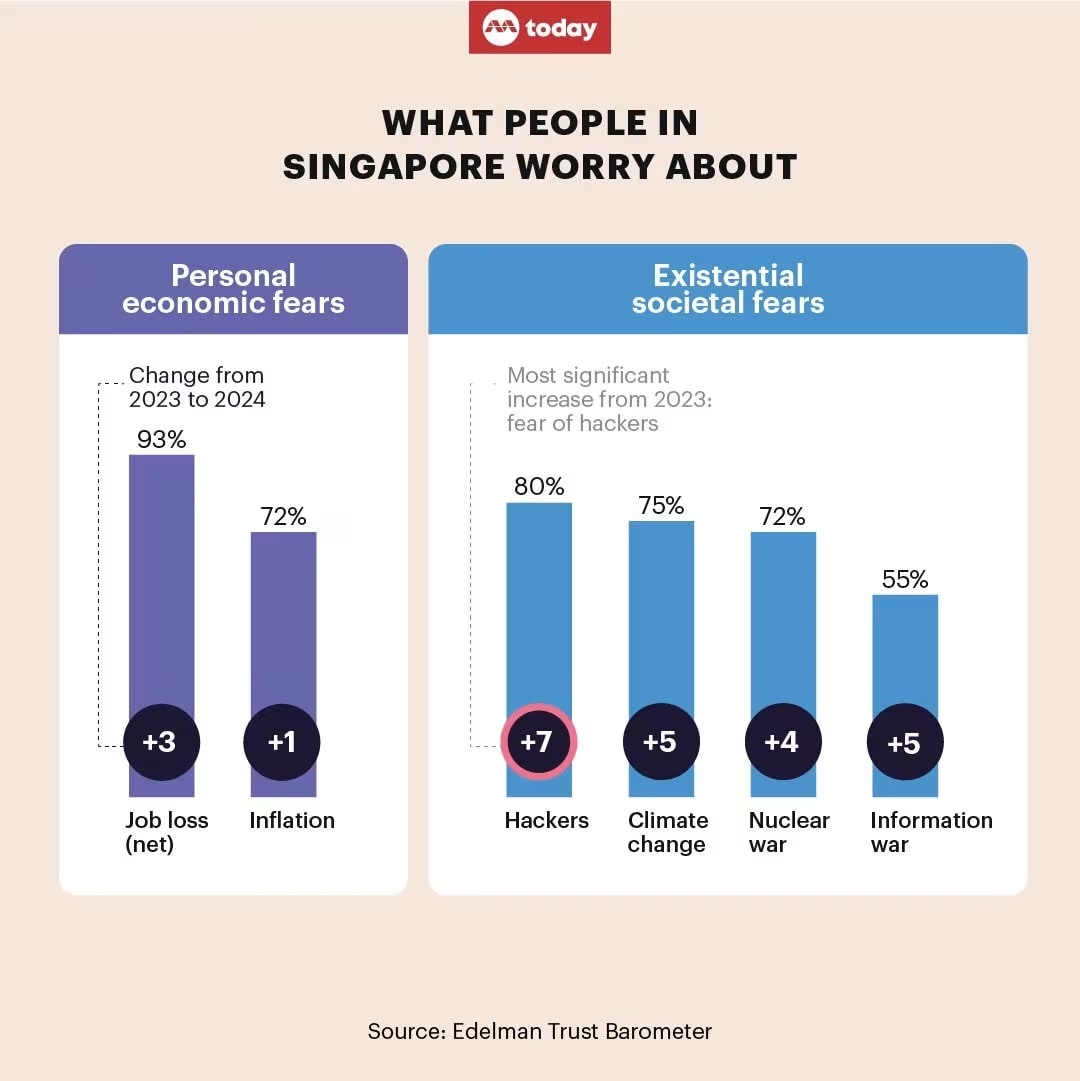
Among the four institutions, Singapore respondents recorded the highest level of trust in the Government to "do what is right" (77 per cent), followed by NGOs (66 per cent), businesses (63 per cent), and the media (60 per cent).
However, when it comes to regulating emerging innovations, half in Singapore - compared to 59 per cent globally - think that government regulators lack adequate understanding of emerging technologies to regulate them effectively.
Almost six in 10 (57 per cent) in Singapore think that Government and organisations that fund research have too much influence on how science is done.
The survey also found that Singapore respondents who believe innovation is poorly managed are much more likely to feel alienated:
- Among such respondents, 73 per cent think technology is changing too quickly in ways that are not good for them, compared to 40 per cent among those who think innovation is well managed
- 82 per cent believe society is changing too quickly and not in ways that benefit them, compared to 45 per cent among those who think innovation is well managed
- More than eight in 10 (81 per cent) of these respondents also believe the system is biassed in favour of the rich, compared to just three in 10 (30 per cent) among those who think innovation is well managed
